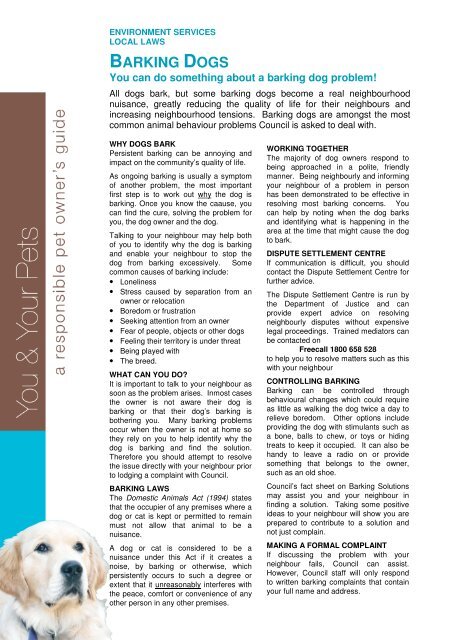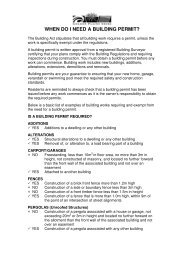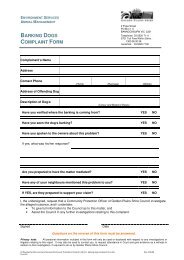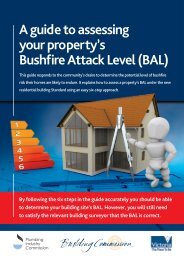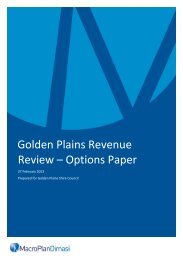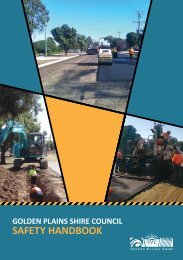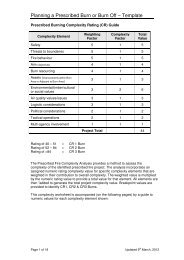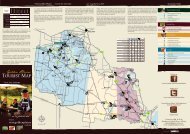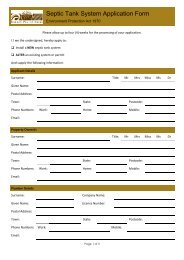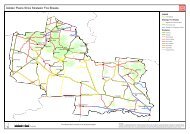BARKING DOGS - Golden Plains Shire
BARKING DOGS - Golden Plains Shire
BARKING DOGS - Golden Plains Shire
You also want an ePaper? Increase the reach of your titles
YUMPU automatically turns print PDFs into web optimized ePapers that Google loves.
ENVIRONMENT SERVICESLOCAL LAWS<strong>BARKING</strong> <strong>DOGS</strong>You can do something about a barking dog problem!All dogs bark, but some barking dogs become a real neighbourhoodnuisance, greatly reducing the quality of life for their neighbours andincreasing neighbourhood tensions. Barking dogs are amongst the mostcommon animal behaviour problems Council is asked to deal with.WHY <strong>DOGS</strong> BARKPersistent barking can be annoying andimpact on the community’s quality of life.As ongoing barking is usually a symptomof another problem, the most importantfirst step is to work out why the dog isbarking. Once you know the caause, youcan find the cure, solving the problem foryou, the dog owner and the dog.Talking to your neighbour may help bothof you to identify why the dog is barkingand enable your neighbour to stop thedog from barking excessively. Somecommon causes of barking include:• Loneliness• Stress caused by separation from anowner or relocation• Boredom or frustration• Seeking attention from an owner• Fear of people, objects or other dogs• Feeling their territory is under threat• Being played with• The breed.WHAT CAN YOU DO?It is important to talk to your neighbour assoon as the problem arises. Inmost casesthe owner is not aware their dog isbarking or that their dog’s barking isbothering you. Many barking problemsoccur when the owner is not at home sothey rely on you to help identify why thedog is barking and find the solution.Therefore you should attempt to resolvethe issue directly with your neighbour priorto lodging a complaint with Council.<strong>BARKING</strong> LAWSThe Domestic Animals Act (1994) statesthat the occupier of any premises where adog or cat is kept or permitted to remainmust not allow that animal to be anuisance.A dog or cat is considered to be anuisance under this Act if it creates anoise, by barking or otherwise, whichpersistently occurs to such a degree orextent that it unreasonably interferes withthe peace, comfort or convenience of anyother person in any other premises.WORKING TOGETHERThe majority of dog owners respond tobeing approached in a polite, friendlymanner. Being neighbourly and informingyour neighbour of a problem in personhas been demonstrated to be effective inresolving most barking concerns. Youcan help by noting when the dog barksand identifying what is happening in thearea at the time that might cause the dogto bark.DISPUTE SETTLEMENT CENTREIf communication is difficult, you shouldcontact the Dispute Settlement Centre forfurther advice.The Dispute Settlement Centre is run bythe Department of Justice and canprovide expert advice on resolvingneighbourly disputes without expensivelegal proceedings. Trained mediators canbe contacted onFreecall 1800 658 528to help you to resolve matters such as thiswith your neighbourCONTROLLING <strong>BARKING</strong>Barking can be controlled throughbehavioural changes which could requireas little as walking the dog twice a day torelieve boredom. Other options includeproviding the dog with stimulants such asa bone, balls to chew, or toys or hidingtreats to keep it occupied. It can also behandy to leave a radio on or providesomething that belongs to the owner,such as an old shoe.Council’s fact sheet on Barking Solutionsmay assist you and your neighbour infinding a solution. Taking some positiveideas to your neighbour will show you areprepared to contribute to a solution andnot just complain.MAKING A FORMAL COMPLAINTIf discussing the problem with yourneighbour fails, Council can assist.However, Council staff will only respondto written barking complaints that containyour full name and address.
Your personal information is treated withconfidentiality but is required in order forCouncil to follow through on aninvestigation. Council will not respond toanonymous complaints.In order to lodge a formal complaint youmust advise Council in writing:• Clearly stating your name and address• Identifying the address of the offendingdog• Containing a copy of a diary detailingthe dates, times and duration of thedog’s barking habits for a period of atleast 14 daysComplaints should be made on a Council‘Barking Complaint Form’ andaccompanied by a diary detailing thetiming and duration of barking events.Both forms are available from Council’sCustomer Service Centres or Website.WHAT WILL COUNCIL DO?• If required to investigate a barkingnuisance complaint, Council will speakwith the dog owner to ensure theyunderstand a complaint has beenmade and provide them with adviceand written information to help themmanage the problem. They will alsobe given an adequate period of time todetermine the cause of the problemand rectify it.• As the complainant, you will be advisedwhen Council has contacted the owner.They will be provided with time to startaddressing the problem. During thisperiod you must continue to keep adiary of barking events to determine ifaction taken by the dog owner isadequately addressing the issue.• If the noise continues, a Council willspeak with other residents in theneighbourhood to validate thecomplaint and determine the extent ofthe nuisance. It is necessary to provethat consistent and persistent barkingis unreasonably interfering with thepeace, comfort or convenience ofanother person’s premises.• If the complaint can be validated,Council will continue to discusssolutions with the dog owner.• Council will not get involved inunsubstantiated complaints that arisefrom neighbourly disputes• If a nuisance barking matter is notresolved through negotiation, it mayrequire legal action.LEGAL ACTIONTo enable Council to issue a fine, anabatement notice or proceed to court, youmust be prepared to be a witness andpresent evidence in Court in front of aMagistrate. In order to provide adequateevidence you will be required to producethe dates, times and duration of barkingevents and clearly demonstrate to aMagistrate how the barking is affectingyou. You may also be subject to crossexamination by a defence lawyer.To support your evidence and prevent acase of ‘their word against yours’, it is alsonecessary for a second neighbour tosupport the nuisance claims, be preparedto complete the nuisance diary and agreeto be a witness in the Magistrate’s Court.If you do not have the necessary evidenceand supporting witnesses, Council will beunable to take the matter further.Court is a last resort and Council willprovide the dog owner with everyopportunity to resolve a matter beforeconsidering legal action.If Council is not prepared to go to Court,you can take civil action against theowner.MORE INFORMATIONFurther information is also available inCouncil’s range of Responsible PetOwnership Fact Sheets. These include:• Dogs, Fences and Roaming• Biting and Aggression• Litter• Leashes and Exercise• Registration and Identification• Responsible Pet Ownership• Barking Solutions• Desexing Your Pet• Registration Fees & FinesCONTACTING COUNCILIf you require any further information, orwould like a copy of one of Council’sResponsible Pet Ownership Fact Sheets,visit either of Council’s Customer ServiceCentres at:• 68 Sussex Street, Linton or• 2 Pope Street, Bannockburn or call 5220 7111 or 1300 36 30 36 (Toll Free within the <strong>Shire</strong>)Email enquiries@gplains.vic.gov.auWebsite www.goldenplains.vic.gov.auG:\Development\Environment Services\Community Protection\Forms\30_AM_IS - BarkingDogs.docRev May 2008Form 30


